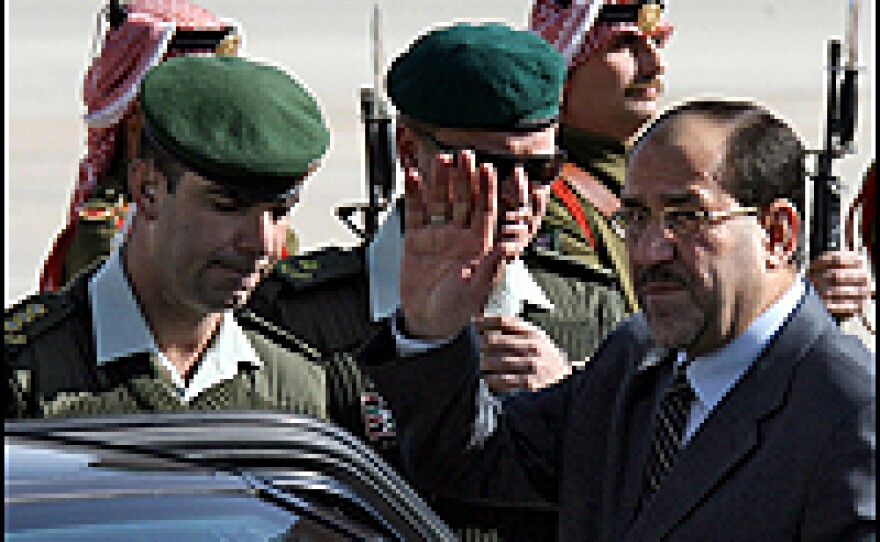In advance of a much-anticipated summit between President Bush and Iraqi Prime Minister Nouri al-Maliki in Jordan, a leaked White House memo threatens to disrupt the meeting.
The memo, written by national security adviser Stephen Hadley and sent to President Bush, offers a candid and critical assessment of Iraq's embattled leader. Now it appears that publication of the classified memo's contents by The New York Times may have prompted the cancellation of the first of a pair of formal meetings the president was to hold with Maliki in the capital city of Amman.
Mr. Bush arrived in Jordan Wednesday evening, local time. He was to sit down with the Iraqi Prime Minister and the Jordanian King shortly thereafter. Instead came an announcement that the session would proceed without Maliki.
The White House denies it was a snub, saying that because the Prime Minister had met with Abdullah prior to Mr. Bush's arrival, that it made the multi-lateral session unncecessary.
"It negated the purpose for a meeting of the three of them," top White House aide Dan Bartlett said.
Did the memo have an impact on that decision? "Absolutely not," Bartlett said.
The Hadley memo to President Bush is dated Nov. 8, the week following Hadley's fact-finding trip to Iraq. In it the national security advisor bluntly notes that he has doubts about Maliki's abilities to lead his country.
Hadley writes:
Despite Maliki's reassuring words, repeated reports from our commanders on the ground contributed to our concerns about Maliki's government. Reports of nondelivery of services to Sunni areas, intervention by the prime minister's office to stop military action against Shia targets and to encourage them against Sunni ones, removal of Iraq's most effective commanders on a sectarian basis and efforts to ensure Shia majorities in all ministries -- when combined with the escalation of Jaish al-Mahdi's (JAM) [the Arabic name for the Mahdi Army] killings -- all suggest a campaign to consolidate Shia power in Baghdad.
Malaki is a Shiite and a member of Iraq's Islamic Dawa Party. Hadley goes on to write that it's not clear if the prime minister is a "witting participant" in an aggressive push by leaders of Iraq's Shiite majority population to consolidate their own power and influence.
From the memo:
"While there does seem to be an aggressive push to consolidate Shia power and influence, it is less clear whether Maliki is a witting participant. The information he receives is undoubtedly skewed by his small circle of Dawa advisers, coloring his actions and interpretation of reality. His intentions seem good when he talks with Americans, and sensitive reporting suggests he is trying to stand up to the Shia hierarchy and force positive change. But the reality on the streets of Baghdad suggests Maliki is either ignorant of what is going on, misrepresenting his intentions, or that his capabilities are not yet sufficient to turn his good intentions into action."
The memo offers a rare glimpse into the kind of discussions about Iraq that are taking place within a very secretive White House. It also seems to directly contradict the White House's frequent professions of support for Maliki, and the confidence the president has expressed in the Iraqi prime minister. Hadley's views, expressed in confidence and now public, make what had already promised to be a difficult session with Maliki even more so.
The White House has acknowledged that it is not pleased with the level progress the Iraqi government has made in boosting its ability quell the worsening violence that ravages Baghdad and other parts of the country 3 1/2 years after the fall of Saddam Hussein. According to the White House the goal of this meeting in Jordan is to listen to Prime Minister Maliki and to see what he needs to accomplish his goals.
At a news conference in Tallinn, Estonia, two days before heading to Jordan, President Bush said he had some questions he wants to ask Maliki: "What do we need to do to succeed? What is your strategy in dealing with the sectarian violence? I will assure him that we will continue to pursue al-Qaida to make sure that they establish a safe haven in Iraq."
The leaked memo immediately put the White House into quick-response mode in Riga, Latvia, where the president attended a two-day summit of NATO member nations in advance of the trip to Jordan.
"The president has confidence in Prime Minister Maliki," Press Secretary Tony Snow said.
Moments later, a pair senior administration officials, speaking only on the condition of anonymity, downplayed the contents of the Hadley memo. One of these officials argued that the revelations contained in the memo would now require the president to convince the Iraqi leader that the U.S. holds him in high regard.
"The president's conversations on a regular basis with Prime Minister Maliki I think have not only provided the personal relationship that is very important in this case, but also the ability of both men to talk candidly about the challenges that the Maliki government faces," the official said.
Copyright 2022 NPR. To see more, visit https://www.npr.org. 9(MDAzMjM2NDYzMDEyMzc1Njk5NjAxNzY3OQ001))







